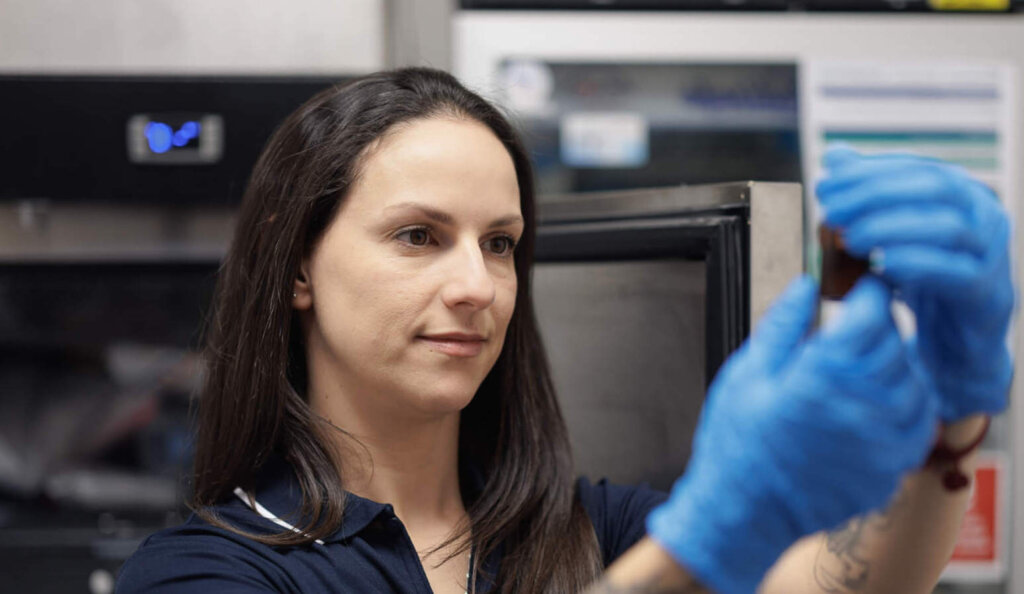A toxicologist’s day: meet Dr Natalia Andriguetti

When you think of drug and alcohol testing, you probably picture the moment a sample is taken by a collector. But that’s only a part of the process. Testing is backed by science and standards, and it’s safeguarded by people who understand the complexities of measuring the presence of drugs and alcohol in the human body.
That’s where people like Dr Natalia Andriguetti come in.
Natalia is a toxicologist who works closely with Dr John Edwards and the AusHealth Diagnostics team. Part of her role is to confirm and report on drug and alcohol test results, mainly for safety-critical industries like mining, construction and transport. But as she explains, the job isn’t just about running lab tests.
“We’re the ones who help figure out if someone is actually impaired by drugs or alcohol or if there’s another explanation,” Natalia says. “It’s not always cut and dried, and that’s why lab confirmation is so important. There are cases where we need to interpret results in context. Someone might test positive for a prescribed medication, for example. Our job is to confirm the presence of the substance and help explain what that might mean in a workplace setting.”
Natalia got her degree in biomedical science in Brazil. She also worked with postgraduate students in a toxicology lab, both there and in Australia, which inspired her to complete a Master’s Degree in Toxicology, and later a PhD., She moved to Australia after being awarded a scholarship.
For her PhD, Natalia analysed dried blood spots from HIV patients in Papua New Guinea to study how their medications were processed, building on similar work she had done with cancer patients during her Master’s.
Looking back, she says the interest was always there. “At age 13, I had a desire to be working as a detective on crime scenes. What I’m doing now is pretty close. I always liked the idea of solving things and understanding how substances affect the body. My mum was a chemistry teacher and my sister’s a biomedical scientist, so it’s in the blood.”
At AusHealth Diagnostics, Natalia manages day-to-day lab operations, writes standard operating procedures for clients, and supports collectors out in the field when they have questions about test procedures.
She’s also involved in quality control, both internal and external. “We do monthly checks using blind samples from a third-party provider and benchmark our results against other labs across Australia,” she says. “We also carry out device checking every time we receive new stock. It’s about accuracy and consistency. Every result matters because someone’s job or safety could depend on it.”
Natalia supports clients in understanding what kind of drug and alcohol testing best suits their business. “Helping choose the right workplace drug testing method is important. Each test provides a different story.”
Beyond the science, it’s the human impact that drives her. “You’re not just testing samples. You’re part of a bigger picture that involves real people and their safety. It’s about accuracy and fairness.”
According to Natalia, one of the biggest misconceptions about drug and alcohol testing is how long substances stay in someone’s system. “People often think if they’ve taken something once, it’s gone in a day or two. But that depends on the substance, the person, and how their body processes it. There are a lot of variables.”
Looking ahead, she sees both challenges and opportunities in the industry. “There are always new psychoactive substances and legal medications that can affect performance. Toxicology will keep evolving and new technology will likely speed up how we screen and report.” She’s anticipating new technologies, new devices and onsite screening options that will increase efficiency, potentially cutting out days of waiting time.
When asked what advice she’d give to workplaces reviewing their drug and alcohol policies, she keeps it simple: “Have clear guidelines. Use lab confirmation. And don’t skip the education part of the process because helping workers understand why testing happens makes a big difference to your culture.”
For Natalia, being a toxicologist isn’t just about lab coats and scientific data. It’s about people, precision and public safety – as well as a healthy dose of curiosity and care.
